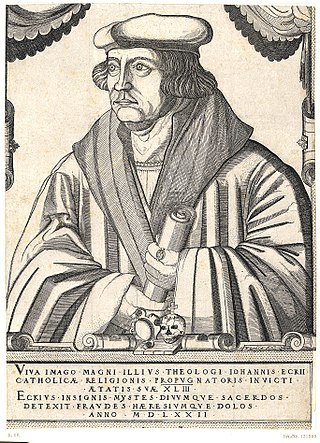
Johann Maier von Eck, often anglicized as John Eck, was a German Catholic theologian, scholastic, prelate, and a pioneer of the counter-reformation who was among Martin Luther's most important interlocutors and theological opponents.
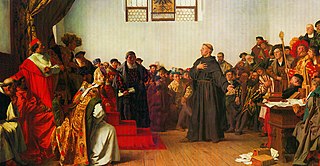
The Diet of Worms of 1521 was an imperial diet of the Holy Roman Empire called by Emperor Charles V and conducted in the Imperial Free City of Worms. Martin Luther was summoned to the diet in order to renounce or reaffirm his views in response to a Papal bull of Pope Leo X. In answer to questioning, he defended these views and refused to recant them. At the end of the diet, the Emperor issued the Edict of Worms, a decree which condemned Luther as "a notorious heretic" and banned citizens of the Empire from propagating his ideas. Although the Protestant Reformation is usually considered to have begun in 1517, the edict signals the first overt schism.

Frederick III, also known as Frederick the Wise, was Prince-elector of Saxony from 1486 to 1525, who is mostly remembered for the protection given to his subject Martin Luther, the seminal figure of the Protestant Reformation. Frederick was the son of Ernest, Elector of Saxony and his wife Elisabeth, daughter of Albert III, Duke of Bavaria.

Torgau is a town on the banks of the Elbe in northwestern Saxony, Germany. It is the capital of the district Nordsachsen.
The Zwickau prophets were three men of the Radical Reformation from Zwickau in the Electorate of Saxony in the Holy Roman Empire who were possibly involved in a disturbance in nearby Wittenberg and its evolving Reformation in early 1522.

Andreas Rudolph Bodenstein von Karlstadt, better known as Andreas Karlstadt, Andreas Carlstadt or Karolostadt, in Latin, Carolstadius, or simply as Andreas Bodenstein, was a German Protestant theologian, University of Wittenberg chancellor, a contemporary of Martin Luther and a reformer of the early Reformation.
Nikolaus Storch was a German weaver and radical lay-preacher in the Saxon town of Zwickau. He and his followers, known as the Zwickau Prophets, played a brief role during the early German Reformation years in south-east Saxony, and there is a view that he was a forerunner of the Anabaptists. In the years 1520–1521, he worked closely with the radical theologian Thomas Müntzer.

William Maurice Denham OBE was an English character actor who appeared in over 100 films and television programmes in his long career.
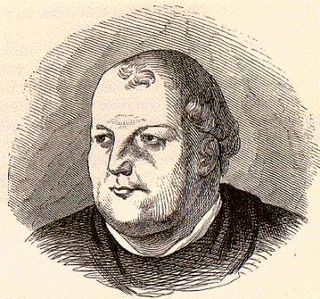
Johann von Staupitz was a German Catholic priest and theologian, university preacher, and Vicar General of the Augustinian friars in Germany, who supervised Martin Luther during a critical period in his spiritual life. Martin Luther himself remarked, "If it had not been for Dr. Staupitz, I should have sunk in hell." Although he remained Catholic, died as a Benedictine monk and had repudiated the Reformation, he is commemorated on 8 November as a priest in the Calendar of Saints of the Lutheran Church–Missouri Synod.
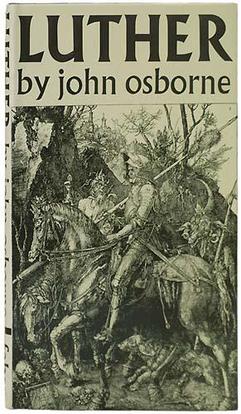
Luther is a 1961 play by John Osborne depicting the life of Martin Luther, one of the foremost instigators of the Protestant Reformation. Albert Finney created the role of Luther, which he performed with the English Stage Company at the Theatre Royal, Nottingham, the Théâtre Sarah Bernhardt, Paris, the Holland Festival, the Royal Court Theatre, London, the Phoenix Theatre, London, and the St. James Theatre, New York.
Gabriel Zwilling, also known as Gabriel Didymus, was a German Lutheran and Protestant Reformer born near Annaberg, Electorate of Saxony. He was educated in Wittenberg and Erfurt. He, like Martin Luther, was a member of the Augustinian order, which he left in 1521.
Lutheranism as a religious movement originated in the early 16th century Holy Roman Empire as an attempt to reform the Catholic Church. The movement originated with the call for a public debate regarding several issues within the Catholic Church by Martin Luther, then a professor of Bible at the young University of Wittenberg. Lutheranism soon became a wider religious and political movement within the Holy Roman Empire owing to support from key electors and the widespread adoption of the printing press. This movement soon spread throughout northern Europe and became the driving force behind the wider Protestant Reformation. Today, Lutheranism has spread from Europe to all six populated continents.
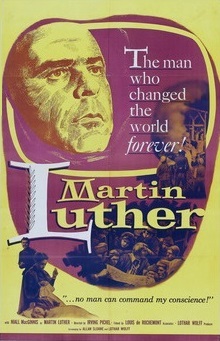
Martin Luther is a 1953 American–West German film biography of Martin Luther. It was directed by Irving Pichel,, and stars Niall MacGinnis as Luther. It was produced by Louis de Rochemont and RD-DR Corporation in collaboration with Lutheran Church Productions and Luther-Film-G.M.B.H.

Luther is a 2003 historical drama film dramatizing the life of Protestant Christian reformer Martin Luther. It is directed by Eric Till and stars Joseph Fiennes in the title role. Alfred Molina, Jonathan Firth, Claire Cox, Bruno Ganz, and Sir Peter Ustinov co-star. The film covers Luther's life from his becoming a friar in 1505, to his trial before the Diet of Augsburg in 1530. The American-German co-production was partially funded by Thrivent Financial for Lutherans, a Christian financial services company.
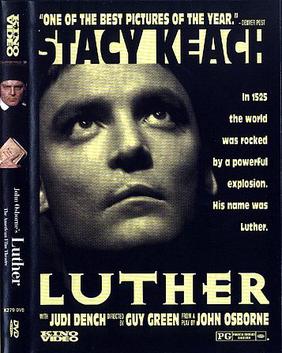
Luther is the 1974 American biographical drama film of John Osborne's biographical play, presenting the life of Martin Luther. It was one of eight in the first season of the American Film Theatre's series of plays made into films. It was produced by Ely Landau, directed by British director Guy Green, and filmed at Shepperton Studios, England. The film presents Martin Luther and his legacy for the world to evaluate. The young knight narrator is an "everyman" character who confronts Luther for advocating the suppression of the Peasants' Revolt of 1524–1526.

The Leipzig Debate was a theological disputation originally between Andreas Karlstadt, Martin Luther and Johann Eck. Karlstadt, the dean of the Wittenberg theological faculty, felt that he had to defend Luther against Eck's critical commentary on the 95 Theses and so challenged Johann Eck, a professor of theology at the University of Ingolstadt, to a public debate concerning the doctrines of free will and grace.
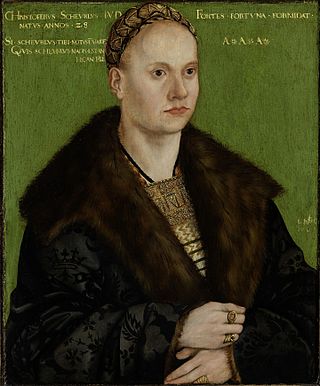
Christoph Scheurl or von Scheurl was a German jurist, diplomat and humanist who became famous for arranging a humanistic friendship between Johann Eck and Martin Luther.

The Lutherhaus is a writer's house museum in Lutherstadt Wittenberg, Germany. Originally built in 1504 as part of the University of Wittenberg, the building was the home of Martin Luther for most of his adult life and a significant location in the history of the Protestant Reformation. Luther was living here when he wrote his 95 Theses.

Christian Beyer was a Saxon Chancellor, international lawyer and Protestant reformer. In documents partially different names and spellings can be found.

Lutheran art consists of all religious art produced for Lutherans and the Lutheran churches. This includes sculpture, painting, and architecture. Artwork in the Lutheran churches arose as a distinct marker of the faith during the Reformation era and attempted to illustrate, supplement and portray in tangible form the teachings of Lutheran theology.















